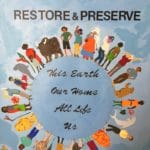Time for Albany to get out of the way of a local law passed by the NYC Council. The lobbying efforts of petroleum companies should not be allowed to stand in the way of good environmental policy.
Rwanda has a law to dissuade people from using plastic bags. Ireland does. China is working on one.Taiwan, South Africa, Australia, and Bangladesh have one. Long Island City and Suffolk County were allowed to have their law. Just not NYC?
It works. And there is policy in place that would allow those on public assistance not to pay. No reason this doesn’t pass except for private profit interests. Our Democratic leadership needs to make a stand here.
From Citizen’s Campaign:
According to the EPA, between 500 billion and a trillion plastic bags are consumed worldwide each year. These bags are used for an average of 12 minutes, but they remain in our landfills, oceans, parks and beaches for thousands of years. Both plastic and paper disposable bags are costly, environmentally damaging, and completely unnecessary. Problems with disposable bags include:
Wasting Natural Resources
It requires vast amounts of natural resources, water, and energy to manufacture and ship disposable bags. Plastic bags are made from fossil fuels, and it requires 2.2 billion pounds of fossil fuel and 3.9 billion gallons of fresh water to produce the 100 billion plastic bags the US consumes each year. The manufacturing of these bags produces a billion pounds of solid waste and 2.7 million tons of CO2 per year. Manufacturing and shipping paper bags require even more energy and water, and create more pollution, than plastic bags. In addition, producing the paper bags used in the U.S. each year requires 14 million trees.
Causing Localized Flooding
Plastic bags never fully break down, and often clog storm drains and damage infrastructure on their way to become ocean pollution. In 1998, plastic bag pollution in Bangledesh clogged storm drains and was the primary cause of severe floods that submerged 2/3 of the country.
Negatively Impacting on Wildlife and Waterways
The mass consumption of plastic products has created a plastic wasteland in our oceans. Globally, there is now more plastic in our oceans than plankton, with 46,000 pieces of plastic in every square mile of ocean. Marine and avian are choked and strangled by discarded bags, and are killed by consuming partially broken-down plastic pieces. This plastic pollution negatively impacts 267 species of marine life.
Increasing Costs to Consumers and Taxpayers
Though plastic and paper bags are given out for free at check-out counters, U.S. retailers spend $4 billion per year on disposable bags, and that cost is passed on to the consumer in the form of higher prices. Once bags are consumed, they are also expensive to clean up and dispose of. For example, New York City spends $10 million disposing of plastic bags.”
NYTimes Op-Ed The Alban Pols Who Love Plastic Bags
“The bag fee is not, in the scheme of things, earth-shattering. It’s a nickel. It is not a tax — the city doesn’t collect or spend any of the revenue — it’s just a calculated inconvenience to give consumers an incentive to shop with reusable bags. The fee is potentially annoying, but it spares the poor and businesses that would suffer unduly, for benefits that would be enjoyed across the populace. Cities that have tried fees have found that they work splendidly.”
Craine’s NY Two words for Albany’s attempt to micromanage NYC: Bag it
“When the City Council passes a bill and the mayor signs it, state lawmakers should intervene only if the measure is egregiously wrong. Charging shoppers a nickel for a disposable bag isn’t going to kill anyone. Indeed, the law—to take effect Feb. 15 unless the state butts in—will have practically no negative impact on consumers. A twice-weekly shopper who somehow fails to bring reusable bags every single time would be spending no more than a few dollars per month on plastic ones.”
Politico NY: Bag law fight prompts questions about Mark-Viverito’s power
“On Tuesday, days before the city law was supposed to go into effect, the state Assembly by a vote of 122 to 15 approved the product of those negotiations: a bill forcing the city to delay implementation of the bag fee…..After years of negotiation, the body ultimately settled for a five-cent fee, an exception for residents receiving public assistance and a program to distribute free reusable bags around the city.”

